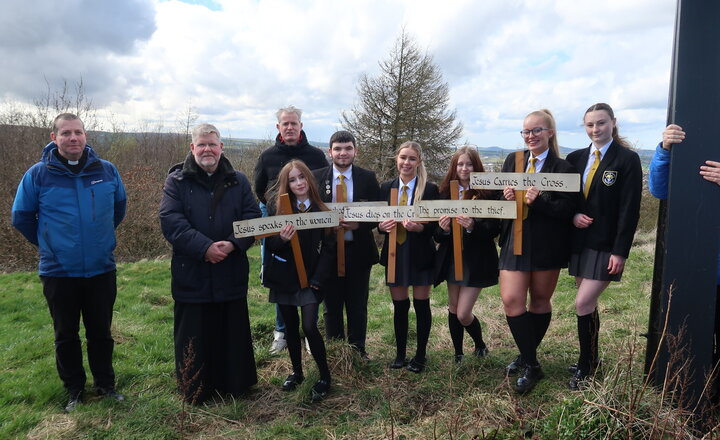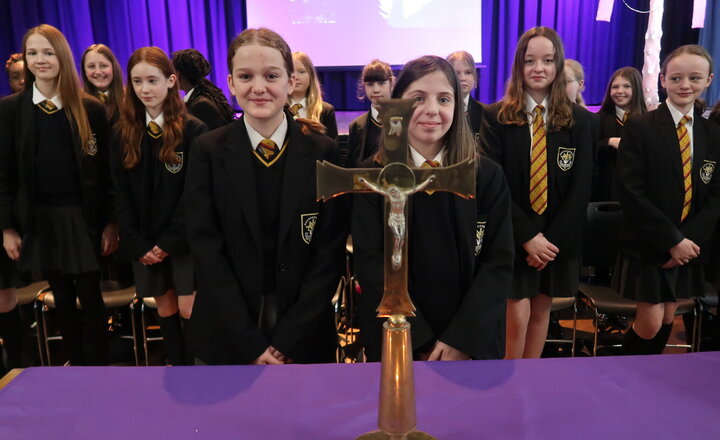"I have come that you may have life and have it to the full” - John 10:10
Vision
Religious education at Mount Carmel is at the core of the curriculum, where we aim to educate the whole individual, building strong foundations for our pupils’ personal development and helping them form sound understanding of our Catholic faith, the faiths of others and different cultures. We aim to provide our pupils with the skills to become religiously literate and capable of considering the deep theological and philosophical questions which are pertinent to our lives today.
Our curriculum aims to fulfil the requirements of the Religious Education Curriculum Directory, issued by the Bishops of England and Wales. We aim to provide a broad and ambitious curriculum which give all pupils, particularly those pupils who are disadvantaged or have additional needs, the knowledge and cultural capital they need to succeed in life. From September 2023, we will begin the roll out the new Religious Education Directory with year 7 and for full implementation from September 2025.
At Mount Carmel we aim to ensure that religious education is given the same status, rigour and vigour as other core subjects. RE receives 10% of the curriculum time, which equates to 5x 1 hour periods over a fortnight, across all years.
We hope to provide our pupils with opportunities to:
Understand the ‘richness of the Catholic faith’ by producing a comprehensive curriculum which engages pupils and allows them to deepen their religious and theological understanding.
Raise pupils’ awareness of the Catholic faith along with their understanding of other religious communities, to allow them to become respectful individuals.
Relate and apply their understanding of the Catholic faith and Gospel values to daily life.
To experience awe, wonder, reflection and consider their personal spirituality.
Build resilience and deepen their curiosity to learn about others.
Deepen their understanding of God as encountered and taught by Catholics.
Develop their skills in order to know and understand, engage and respond (by making connections) and then analysing and evaluating these concepts and beliefs.
Intent KS3
KS3 curriculum
The key stage 3 RE course is designed to fulfil the requirements of the Curriculum Directory for Religious Education. Pupils are assessed regularly throughout each year.
Learning is embedded through the development of knowledge and skills over time. In key stage 3, the curriculum breadth supports pupils’ knowledge and understanding of the main world religions, such as Christianity, Islam and Judaism. Planning is based on thematic studies whilst also where possible considering the historical development of the Christian faith, that are built on year by year, to enrich and consolidate a basic understanding at key stage 3 of some of the key concepts that are revisited again at key stage 4 in more breadth and depth.
Pupils build upon their knowledge of key beliefs to allow them to consider the influence religious beliefs can have on religious believers. Pupils can then take this deeper understanding further and form considered analysis and evaluation of these key beliefs and practices and the impact on a believer’s life.
The Year 7 course involves the study of:
Creation and Covenant - A study of what Catholics believe about God his Creation of the world and humanity. Pupils will consider the Genesis accounts of Creation, human responsibility to the world in terms of stewardship and Pope Francis' call to heal our Common Home (in Laudato Si') and the role of prayer in the call to Live Simply.
Prophecy and Promise - A study of the importance of the Bible for Christians, including the Old and New Testaments. Pupils will explore the importance of Scripture in prayer and worship and some specifically Catholic approaches to the Bible as an aid to prayer.
Galilee to Jerusalem - A study of the person and identity of Jesus Christ. Pupils will consider the different titles and roles of Jesus, His role at the centre of the Trinity and how Jesus can be considered the perfect human being and role mode.
Desert to Garden - A study of the mysteries of the Easter story and the Sacraments of the Catholic Church. Pupils will consider the history and origins of the Mass, the importance of the Eucharist and the purpose of Jesus's sacrifice on the Cross.
To the Ends of the Earth - A study of the importance of Pentecost and the gifts of the Holy Spirit. Pupils will explore the role of the Holy Spirit as the third person of the Trinity and also the significance of the Sacrament of Confirmation.
Dialogue and Encounter - A study of the relationship between different Christian groups around the world. Pupils will explore why there are so many Christian denominations. Pupils will also consider another world view from the Dharmic traditions: Buddhism.
The Year 8 course involves the study of:
The People of God – key religious figures which have featured in the Bible and other religious texts (making comparisons between these where overlaps happen). People who have put their faith in God and been faithful to Him.
Judaism – a study of beliefs and practices, building on the knowledge from the previous topic about Abraham and Moses, being key founders in the Jewish faith.
Storytelling and New Testament stories – next chronological step following the teachings of Judaism, considering the New Testament, and the differences between the stories told by Jesus and those from Old Testament. This makes connections between the year 7 topic of Old Testament stories and the Bible.
Sacraments and vocation – considering links between the events of Jesus’ life (studied in year 7) and the topic of the ‘People of God’ studied earlier in the year. (New topic 2019/2020)
Social injustice – thinking about the issues with justice in society today, making links between these issues and how as Catholics we can help to overcome these issues, link to the teachings of Jesus and the 10 commandments as learnt in previous topics. Links to the topic of vocation and how we can put our vocation into action to overcome these issues.
The Year 9 course involves the study of: (in preparation for changes to GCSE specification for this cohort)
Christian living – pupils are giving opportunities to consider key moral and ethical issues which face the world today, considering the key issues like wealth and poverty, the work of Catholic charities like CAFOD and other issues such as abortion and euthanasia.
Islam: beliefs and teachings - pupils consider the foundational beliefs of Muslims and what these teachings do to influence their actions and behaviours.
Pilgrimage – historical beliefs about places of pilgrimage and concepts of miracles. Based on the beliefs and practices of both Christians and Muslims, places of pilgrimage both faiths visit. Consideration of what can be gained from visiting these places.
Islam – practices – how do the beliefs of Muslims affect their behaviour and actions within their faith? Religious festivals. These topics have been previously studied at GCSE, however we are changing GCSE specifications in September 2020 with this cohort therefore covering these topics as our world faith.
The Church and its mission – considering beliefs about the Catholic Church as the Body of Christ and People of God and how the Catholic church came to exist. This is a transitional unit in preparation for the Catholic Christianity GCSE.
How will the subject be assessed?
At key stage three, assessment is on-going by the means of continual formative assessment which takes place in lessons and homework via a variety of methods. Assessment questions, complement the Eduqas/Edexcel style of questioning and reflect the NBRIA age related standards are used to build upon their skills from key stage 3 while familiarising pupils with the skills needed at key stage 4. Summative assessment takes the form of end of topic tests and assessments, these can use assessment style questions and other more creative approaches to assessment.
Intent KS4
Current KS4 curriculum (year 10 and 11)
The RE department at Mount Carmel is dedicated to helping students understand the world around them. Building on the rich Christian heritage of our school and our Catholic ethos, we aim to deepen their knowledge and understanding, primarily of the Catholic faith in KS3, but inclusive of all major world faiths.
By KS4 Catholic Christianity and Judaism are studied in depth at GCSE standard. We aim to equip all students with the ability to think for themselves as they study philosophical, theological and social issues. To be open minded to other points of view and to identify and challenge misconceptions and prejudice. To listen to each other and not be afraid of making their own voice heard, justifying their viewpoint with reasoned consideration. We aim to encourage students to be critical thinkers and develop their literacy ability in order to debate controversial issues without causing offense to others.
We want students to be inspired by Religious Studies, motivated to make a positive difference in the lives of those around them. Religious Studies aims to give them confidence to be courageous advocates for those who suffer injustice and discrimination.
We want all students to aim high and progress to be the best they can be, whatever their situation or starting point.
Academically, by reaching and surpassing their expected banding or grade. Personally, by becoming good, respectful and caring individuals, who will continue to be hard working, decent, honest young adults who are well placed to leave the school and make a positive contribution to society. This is at the heart of the school’s mission.
How will the subject be assessed?
At key stage four, informal assessment is on-going by the means of continual formative assessment which takes place in lessons and homework via a variety of methods. Summative assessment takes the form of end of topic tests which are then used formatively. Pupils sit up to three internal assessments in formal conditions (PPEs) and these are used to inform additional learning support strategies.
Formal assessment at the end of the course is through the Edexcel examination board (Religious Studies Specification A).
Edexcel GCSE RE:
At key stage 4, we will be studying GCSE Edexcel Religious Studies A, studying Catholic Christianity and another world religion (Judaism).
A SOL has been developed to ensure that all skills and subject knowledge from key stage 3 is built upon so that pupils are prepared appropriately, covering all the subject content in a logical sequence fulfilling the assessment objectives:
| Pupils must: | % in GCSE |
|
| A01 | Demonstrate knowledge and understanding of religion and belief, including:
|
50% |
| A02 | Analyse and evaluate aspects of religion and belief, including their significance and influence | 50% |
| Total | 100% |
(Again, these are built within the NBRIA age related standards that are used throughout Key Stage 3)
During this course, pupils will study for three examination papers.
Paper 1: Catholic Christianity – 1 hour 45 minute exam – 50% weighting
This area of study comprises a study in depth of Catholic Christianity as a lived religion in the United Kingdom and throughout the world. There are four sections: beliefs and teachings; practices; sources of wisdom and authority; forms of expression and ways of life. Pupils should compare and contrast the areas of belief and practice within Catholic Christianity with wider Christian perspectives.
Paper 2: Judaism – 50 minute exam – 25% weighting
This area of study comprises a study in depth of Judaism as a lived religion in the United Kingdom and throughout the world. There are two sections: beliefs and teachings; practices.
Paper 3: Philosophy and ethics – Catholic Christianity – 50 minute exam – 25% weighting:
This area of study comprises a study in depth of aspects of philosophy and ethics in the context of Catholic Christianity as a lived religion within the United Kingdom and throughout the world. There are two sections: arguments for the existence of God; religious teachings on relationships and families in the 21st century.
The significance and importance of the various beliefs, issues and practices to Catholics today should be explored throughout the two sections. This should include reference to how the Bible informs a Christian’s understanding of the topics and how approaches to the issues are underpinned by philosophical arguments and ethical theory as applicable. Pupils will be expected to study Catholic Christianity within the context of the wider British society, the religious traditions of which are, in the main, Christian. Pupils should recognise that Catholic Christianity is one of the many religions and world views in Great Britain, which include Buddhism, Hinduism, Islam, Judaism, Sikhism and non-religious views such as Humanism and atheism.
This knowledge may be applied throughout the assessment of the specified content. Pupils should compare and contrast the areas of ethics and/or philosophy within Catholic Christianity with wider Christian perspectives and non-religious views as outlined in the content below. Pupils should also recognise that within Catholic Christianity there may be more than one perspective in the way beliefs and teachings are understood and expressed. Common and divergent views within the wider Christian tradition in the way beliefs and teachings are understood and expressed should be included throughout, including reference to Orthodox, Protestant and other Christian traditions.
How will the subject be assessed?
At key stage four, informal assessment is on-going by the means of continual formative assessment which takes place in lessons and homework via a variety of methods. This assessment takes place in lessons and homework. Summative assessment takes the form of end of topic tests which are then used formatively. Pupils sit up to three internal assessments in formal conditions (PPEs) and these are used to inform additional learning support strategies.
Formal assessment at the end of the course is through the Edexcel examination board.
You need to be able to work well as part of a team as well as on your own.
Enrichment and/or extra-curricular activities
- Multi-faith day
- Year 9 health day
- Guest speakers (TBC)
- RE ALS (additional Learning support)/intervention for year 11 – Thursdays 3-4pm
- Trips abroad – pilgrimage to Rome (TBC)
- YSVP group
- Community links – visits to Roughlee Care Home
Next steps (College, University, career)
What can the subject prepare me for?
There is a range of vocational qualifications (such as BTECs, NVQ/SVQs and diplomas) linked to religious studies, including:
- Travel and tourism
- Health and social care
- Childcare
- Uniformed public services
- Legal studies
Apprenticeships
There are some apprenticeships associated with religious studies such as:
- Arts, media and publishing, e.g. exhibition guide, visitor services support
- Leisure, travel and tourism, e.g. tourist guide, travel advisor
- Health, public services and care, e.g. community support worker
- Education and training, e.g. learning support assistant
Academic subjects – such as A levels, University
- You can study religious studies at A-Level, and/or at Undergraduate level in many academic institutions. Related subjects include health and social care, geography, law, history, classical civilisation, sociology, philosophy, psychology, government and politics, communication and culture.
- Skills and qualities - from studying religious studies
- Problem solving
- Some jobs particularly require problem solving skills and creative thinking to recognise problems and their causes, to identify a range of possible solutions and then assess and decide the best way forward.
- Patience
- You’ll need to be able to tolerate waiting, delay, or frustration without becoming agitated or upset. Some jobs require lots of patience such as dealing with customers or clients who may be upset or unwell, and job roles where you have to explain or repeat information or instructions.
- Literacy
- You’ll need good reading and writing skills. This could include a good standard of spoken and written English, and good knowledge of spelling, punctuation, and grammar.
- Interpersonal skills
- You’ll need listening and speaking skills, as well empathy to build friendships and ensure good working relationships.
- Any student who is considering going into air cabin crew, law, medicine, teaching, police work, or academic professions will need good grades in GCSE RE.
Subject results are available upon request.
Additional resources:
https://senecalearning.com/en-GB/ (Useful for GCSE Edexcel Specification A)
https://www.bbc.co.uk/bitesize/topics/z6jv2sg - Edexcel Catholic Christianity revision website
https://www.bbc.co.uk/bitesize/topics/zvp8f4j - Edexcel Judaism revision website
https://bit.ly/3wanUyE - Link for GCSE Edexcel A Exam Specification – Catholic Christianity
Related News

Good Friday Stations of the Cross 2024

Food Pantry donations
